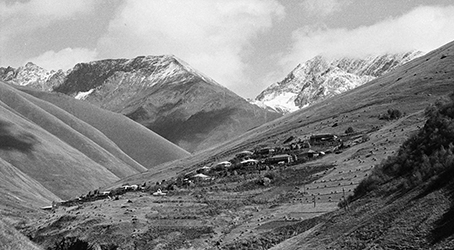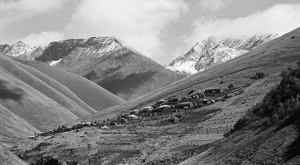Ts’utisopeli: Preserving Georgia’s Heritage
Georgia is still a fiercely rural country. Roughly two-thirds of the country’s 4.5 million residents live in provincial towns and villages. Visitors to this Caucasian kingdom-turned-republic are regaled with folk fare such as supras, lengthy toasts, traditional music and long gulps of wine from the khantsi (wine horn). Tbilisi may be the country’s political center, but if Georgia’s head is there, it’s heart is certainly in the countryside.
Things are changing, however. Thousands of people leave the village behind each year, leading to fears that the country’s rural roots are beginning to fray.
“There is hardly any work for people in the villages today, so it is no surprise that youth continue to head either towards the capital or abroad to seek better opportunity,” says Aurelia Shrenker, an enthnomusicologist working in rural Georgia. “With each wave of urbanization, folk songs (and folk traditions in general) are largely removed from their original functions and assume different purposes.”
The need for cultural preservation is why Shrenker launched Ts’utisopeli, a project aimed at keeping Georgia’s heart in the village by documenting, recording and sharing folk music. (Ts’utisopeli means “minute village” in the Georgian language, a reference to a proverb about the short-term nature of earthly life).
Shrenker began recording Georgian music in 2010 and has spent the past five years traveling through eastern Georgia and collecting folk songs along the way. Her work recently came to full fruition with the launch of the organization’s website, tsutisopeli.com.
The site features a library of more than 400 songs recorded by 70 artists from dozens of villages across eastern Georgia. Visitors can access audio files as well as lyrics and artist biographies in both English and Georgian.
Shrenker first became captivated by Georgian music at age 13 as a member of Village Harmony, a choral organization that teaches and performs polyphonic (multi-voiced) sounds from all over the world. “I was fortunate to be taught first by Nato Zumbadze, an ethnomusicologist from the Tbilisi Conservatoire,” she recalls.
Her first trip to Georgia came three years later, in 2003. The country was undergoing a rapid transformation following the Rose Revolution, and Shrenker arrived to attend a workshop with the Zedashe Ensemble in Signaghi.
She was enthralled by Kakhetian vocal and instrumental styles. The ikmpression left by Georgia extended far beyond music, however. “I was profoundly touched by my experiences in Georgia - the people, the song and dance, the cuisine and supra tradition, the mountains,” she says.
Shrenker settled in the country in 2010 after studing ethnomusicology at the University of California and New York University. That year she began documenting and recording traditional village music, and the Ts’utisopeli project was born.
She and fellow ethnographer Richard Berkeley spent five years traveling across three regions in eastern Georgia, Kakheti, Mtskheta-Mtianeti and Lower Kartli, engaging with local people and recording music along the way.
They chose eastern Georgia as the project’s focus because of the unique quality of its music. While most Georgian music relies on an unaccompanied, three-part polyphony structure, the songs of eastern Georgia are often accompanied by the panduri, a three-stringed lute.
Ts’utisopeli provided an opportunity to work with local artists, some of whom have been playing Georgian folk music for more than 50 years and have witnessed the country’s transformation first hand. One artist of note is Mariam Gorelashvili from the tiny village of Kvemo Art’ani. In the 1960s the village was bustling, by her account. Today, it is nearly empty.
Music is Shenker’s chosen medium, but Ts’utisopeli represents a broader project. Its purpose is to help Georgia retain its rich canon of traditions, of which music is only a part. In her view, this is what makes Georgia wonderful. “I was enthralled by the connectedness of the people to their roots,” she tells me. “The country is so small, but each region is truly distinct.”
The project’s library is already extensive, but Shrenker isn’t finished. By conserving what remains of the nation’s folk music and making it accessible to listeners in Georgia and elsewhere, her mission is to help Georgians reconnect with their heritage while helping share it with others.
For that, she plans to travel to other regions in Georgia, documenting and recording more music. For Shrenker, preserving Georgia’s cultural heritage many not be easy, but it is necessary: “We all need to consider what is important to each of us, what is worth conserving and sharing — Because it does take work, and without this intention and effort, things that are still alive today will certainly disappear.”
Joseph Larsen












